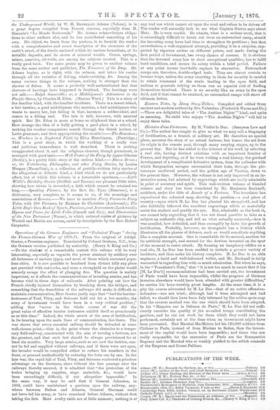Operations of the German Engineers and "Technical Troops " during
the Franco-German War of 1870-71. From the original of Adolph Goetze, a Prussian engineer. Translated by Colonel Graham, V.C., from the German version published by authority. (Henry S. King and Co.) —To the student of a remarkable contest this volume will be very interesting, especially as regards the power attained by artillery over all fortresses of ancient types, and most of those which surround popu- lous cities. It is now possible to bombard from distant hills any place not provided with outworks, and even a stronghold on the plains would scarcely escape the effect of plunging fire. The question is mainly important, as it affects the communications of invading armies, and has become vital in these days of railroads. After pointing out how the French chiefly injured themselves by breaking down the bridges, and remarking that the demolition of the railways did make it difficult to maintain communication, Herr Goetze justly says that " had the barrier- fortresses of Toad, Vitry, and Soissons held out for a few months, the army of investment would have been in a very critical position ;" adding that "never in the whole course of war did the great value of effective barrier fortresses exhibit itself so prominently as at this time." Indeed, the whole secret of the uses of fortification, in its bearing upon the main lines of communication, lies there. The war shows that every essential railway should be defended at some well-chosen point,—that is, the point where the obstacles to a tempo- rary field-railway, constructed with the aim of turning a fortress, are the greatest, and that each fort should be always provisioned for at least six months. Very large armies, such as are now the fashion, can- not be fed and supplied without railways, and if these were not open, the invader would be compelled either to reduce his numbers in the front, or proceed methodically by reducing the forts one by one. In the late war, the rapid fall of Tout, Vitry, and Soissons conferred a priceless advantage on the Germans, since without the free passage over the railways thereby secured, it is admitted that "the protection of the trains bringing up supplies, siege materials, &c., would have been exceedingly difficult, if not altogether impossible." In the same way, it may be said that if General Johnston, in 1864, could have maintained a garrison upon the railway, any- where between Dalton and Atlanta, General Sherman could not have fed his army, or have remained before Atlanta, without first taking the fort. More avalry raids are of little moment ; nothing is of
any real use which cannot sit upon the road and refuse to be driven off The reader will naturally look to see what Captain Goetze says about Metz. He is very candid. He admits, what is a serious truth, that it is exceedingly difficult to break out from an entrenched camp, should the investing army have had time to strengthen its positions ; but that nevertheless, a well-organised attempt, providing it be a surprise, sup- ported by vigorous sorties on different points, and made during the first period of investment, has every chance of success. It is obvious that the invested army has to show exceptional qualities, has to fulfil bard conditions, and secure its safety within a brief period. Failure at any point means inevitable capture by starvation. Entrenched camps are, therefore, double-edged tools. They are almost certain to become traps, unless the army resorting to them for security is careful to retain command of the roads leading to the open field, and nations or generals relying on them run an especial risk of finding themselves deceived. There is no security like an army in the open field, and if that cannot be retained, no entrenched camps will stave off ultimate defeat.










































 Previous page
Previous page